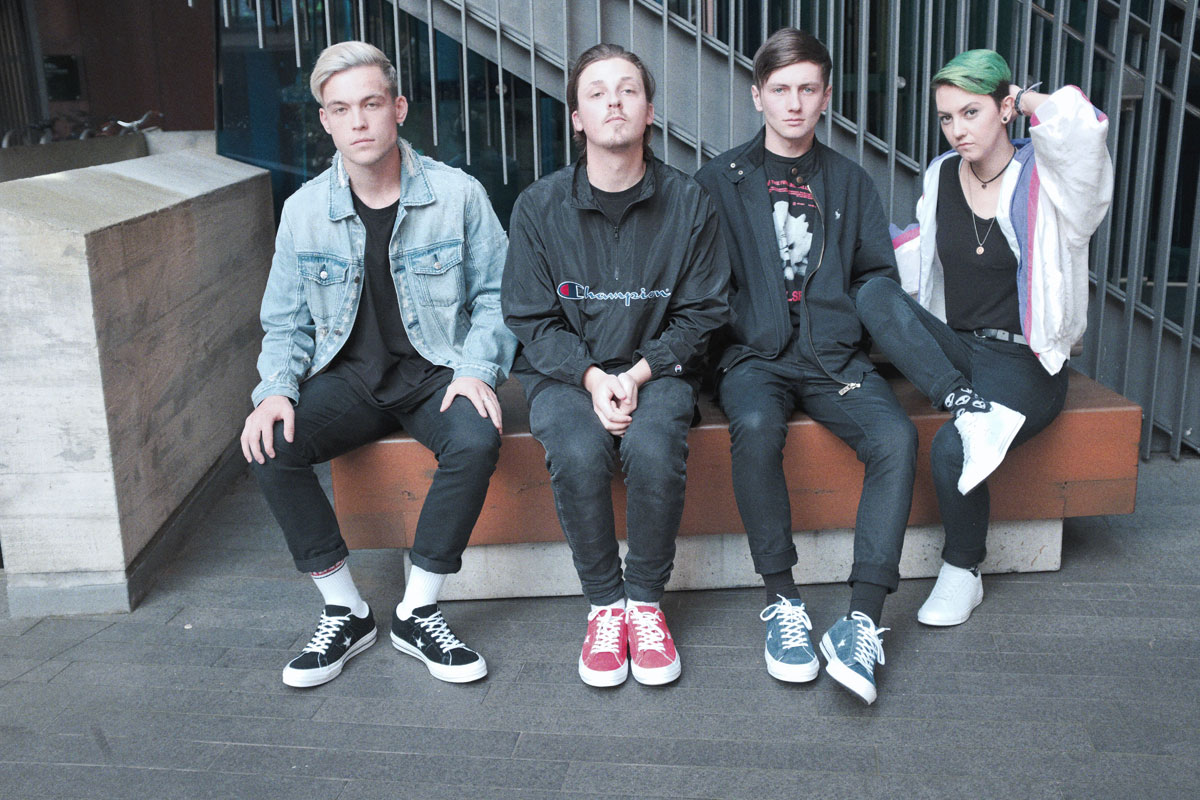
Having opened for the likes of Twenty One Pilots, Melanie Martinez, Ellie Goulding, and more, New Zealand band Openside are as energetic in real life as their hook-laden music would suggest. While enthusiastically drawing self-portraits of themselves, the four-piece band excitedly discuss what 2017 has in store for them - and with a new single set for release in just a few weeks time, they’re on the brink of gaining more momentum than ever before.
We spoke to Openside about their upcoming new single, how style plays a role in the band, and more...

[Openside are wearing the new Converse One Star sneaker in all photos]
COUP DE MAIN: How do you integrate style and fashion into the overall concept of Openside?
OPENSIDE - GEORGE POWELL: That’s actually something that we’ve only started to hone in on recently. From the stuff that’s currently public on our social media you’d probably think that we didn’t, but a lot of our new press, and the video - it’s got this really cohesive aesthetic. For me, I’m a big fan of fashion, and seeing how we all look together - we look like one unit. We’ve got individual styles, but the same--
OPENSIDE - HARRY CARTER: I like black.
GEORGE: Having a good sense of fashion is gonna do us wonders. It’s so important - maybe something we didn’t think was before.
HARRY: My first pair of Converse were those black and white leather ones.
GEORGE: Mine were like high-top Chuck Taylors.
OPENSIDE - PJ SHEPHERD: Mine were tri-tone, they went black to grey to white. There were three panels.
OPENSIDE - POSSUM PLOWS: I used to have heaps! The white leather with the blue and red I think.
CDM: How do you go about choosing outfits/shoes etc to wear during your stage-shows?
HARRY: We all like to be the same colour. We had trouble in the past, we all used to come to a gig wearing our hardest spit, but now we make it aesthetic.
GEORGE: Our next live show you’ll probably see a bit more of that on-stage connectivity in terms of our fashion. You’ve got to be practical about it as well, you’ve got to move a lot and it gets so hot. It’s like a work-out, the lights are so hot.
POSSUM: That’s another thing that you notice as a support band watching these professional musicians work - is how their outfits are so cohesive and interesting. Sometimes you want to wear something which is what you’d regularly wear, but just a little nicer - but I’ve found that if I push myself further beyond that, like, ‘I wouldn’t be comfortable wearing this in public,’ it’s probably going to look more interesting on-stage. It’s always taking it a few steps further than what you think is necessary.
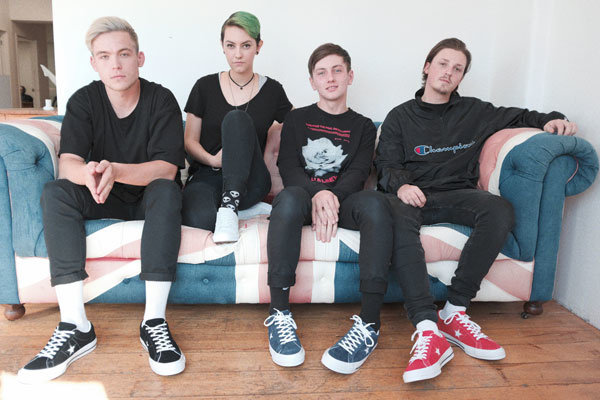
CDM: How would you style your own pair of Converse One Star sneakers?
HARRY: Just black; what I’m wearing now.
POSSUM: I always wear black shoes, but here I’m in pastel-land. So I’m imagining white jeans, maybe I’ll pastel my hair. Maybe it’s different shades of pastels. It’s a Summer look.
PJ: I’m gonna go full Levi’s double-denim. Full navy, 504s. It’s the raw denim! Jeans, jacket, and then I’ll have to get a cowboy hat to match it.
GEORGE: I feel like for these shoes, I’d wear black pants, a white tee tucked in, a leather jacket, slick my hair back fully, and get 60% of my body tattooed.
CDM: If the Converse One Star sneaker were a song, what would it be?
GEORGE: ‘Smoke On The Water’ by Deep Purple.
POSSUM: Why?
GEORGE: I’m glad you asked. Because they’re the original sneaker, and ‘Smoke On The Water’ is like the original rock song, in my opinion.
PJ: I reckon mine would be ‘Life Is A Highway’. I remember when we were driving Route 66 and we listened to that song, it was perfect, I was so comfortable. And I’m quite comfortable right now.
POSSUM: I was just thinking, “Hey now, you’re an all-star…”
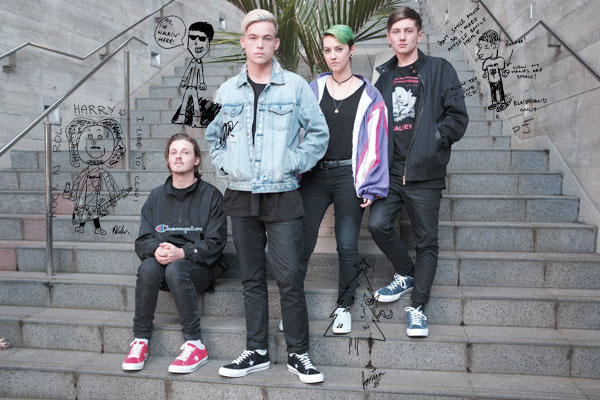
CDM: How has your songwriting process changed since the beginning of Openside?
PJ: It’s way more collaborative now.
POSSUM: It used to be more, PJ mostly would make an instrumental, and then I’d write most of the vocals - and then we’d just make little tweaks with a producer. Now we do a lot more writing in the studio together, and also working with co-writing with other people too.
PJ: Working in new studios with new producers, it gives you a good perspective on how other people write. Before it’d just be bedroom stuff, then we’d take it to the studio. But starting in the studio, and starting with a fresh mind, it gives you the idea, ‘Oh, we don’t have to write like that the whole time,’ and ‘Maybe we can start the vocals and work our way backwards.’
POSSUM: A big thing for me, was I did SongHubs this year - there was 20 people, and you’d write a whole song in a day, and produce it as you go, and that’s how I met Djeisan [Suskov] and started working with him. It was such an eye-opening experience, working with people who are writing at that level. It lifts you up and inspires you to be better, and work harder.
CDM: What was it like, going from writing with just you guys, to with more co-writers?
GEORGE: It was incredible, it’s a really good way to step up your game. Particularly, because everyone we work with for the most part, are in their 30s and they’ve just had a wealth of experience of being songwriters. We’re really young, and we don’t pretend that we’re not--
CDM: How old are you guys?
GEORGE: I’m 19, so is Harry. Possum’s 23, and PJ’s 20.
HARRY: I’m almost 20.
GEORGE: So 20 is the average age for the band. There’s so much to learn. All of these guys [that we’ve been working with] have stuff that you can’t really teach - it’s only the skill that comes with being in the game for years and years. It’s made us better as a group - for when we’re not with them as well.
POSSUM: You just learn quicker when you’re working with other people. Sometimes there is a tendency as an artistic person to want to create things in your own little bubble, your own little world, and you’re precious about your ideas - but it gets insular, and you end up repeating the ideas over and over again. Once you start working with people who think differently, you learn new skills.
PJ: And you start regretting that whole, ‘Oh, I’m going to do my own thing, and I’m going to make sure that I do this by myself.’ After a while, you think learning from these people, 'There’s so much more in the world.'
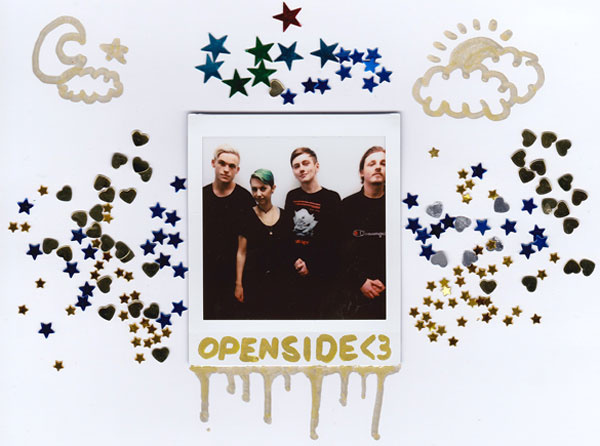
CDM: How do you know when a song is complete?
GEORGE: It’s actually really hard to know sometimes - sometimes you want to keep working at it. That’s one of the big things we picked up from Josh Fountain, is that there’s a point where you work on something too much, and you’re going to make it worse. It’s important to know when to leave it, and to be confident in the work you’ve done.
HARRY: I think when I’m in the car, chuck it on and start listening to it, and think, ‘It’s ready.’
PJ: The car test is good, especially when you’re by yourself.
CDM: When you’re songwriting, are you thinking about how to play it in a live setting straight away?
PJ: The way we do it, we do write the song and then we approach it live next. But we always think, ‘How can we make this live?’
POSSUM: Sometimes that’s what gets you hyped writing it - like, ‘Oh, that’ll be so cool live!’ It’s little moments of those. But mostly we’ll write the whole thing in the studio and then go, ‘How do we play this?’
GEORGE: Our live performance is really important to us though. As a band, I feel like we bring a huge energy on-stage - and you can take that as you wish, aside from being loud, we just have stage presence, and energy, and audience interaction. Bringing the songs to life live is really important to us.
CDM: You’ve had a heap of rad openings slots (Twenty One Pilots, All Time Low, Ellie Goulding, Melanie Martinez). Who’s someone you guys would love to open for, that you haven’t already?
GEORGE: Halsey.
POSSUM: Fall Out Boy.
GEORGE: The 1975 could be really cool. Maybe someone huge, if some freak of nature we did something like a Rihanna show?
HARRY: The Twenty One Pilots fans are the dopest I have ever come across.
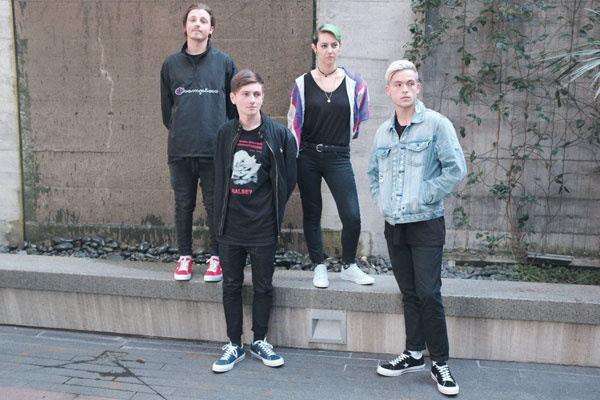
CDM: What do you take away from these opening slots / do you learn stuff from watching the headline acts perform?
PJ: Heaps.
GEORGE: It’s usually so slick and polished.
HARRY: You can definitely learn a lot in terms of how they set up; what drums they use.
CDM: Getting all their tech specs?
HARRY: Yeah!
GEORGE: In a way though. When we did the Ellie Goulding show in Christchurch, I remember being on-stage looking at all their Ableton set-ups, nerding out.
HARRY: But then you can also see what your favourite bands are like, behind closed doors.
GEORGE: We met Twenty One Pilots the first time we opened for them, and they were the loveliest dudes ever. They really gave us the time of day, and they didn’t have to.
PJ: They came up to us and were like, ‘Hey guys, so excited to be here with you.’
POSSUM: With us, we only will meet them if they make a point of coming and saying hi - you don’t want to be that guy that’s hanging around.
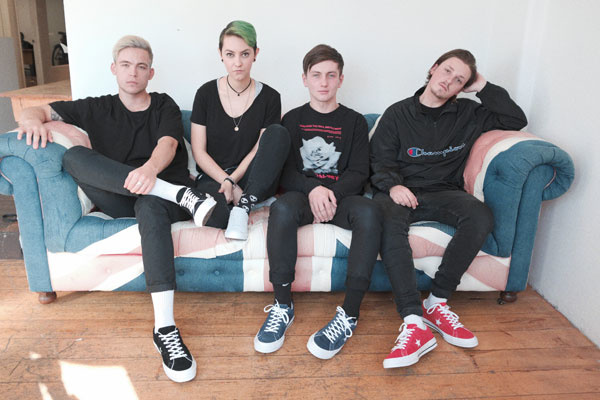
CDM: Possum, you’ve spoken about your admiration for songwriters like Pete Wentz, referring to his bipolar disorder in songs. Why do you think it’s important for music, and pop music to be able to explore ideas around mental illness?
POSSUM: A big part, of especially our genre of music, with bands like Fall Out Boy, people like Halsey - their fanbase is young people, primarily. It plays such a huge role in your life, when you’re young, the bands that you listen to. Even with kids that go to concerts, and camp out, that’s how they meet their friends, it can really affect your whole world if the people you look up to are willing to talk about these things frankly. Anything in life that is hard, or anything that makes you different or that you struggle with - that’s what the arts should do, shine a light on these complicated parts of being human. Especially being young, and all of the emotions that go along with that. For me, I know it made a huge difference in feeling comfortable with myself, and getting through high school. I always think about high school as this place, no matter what, you’re forced to keep going back. You could be getting bullied, and you have to see the same kids - you’re trapped there, you have no agency, or ability to make any other choice for yourself. It can be like a battleground, and how are you supposed to get through if you don’t have people that you look up to?
HARRY: Chuck your headphones on...
POSSUM: Yeah, and they talk about this stuff! And even if you don’t have friends at school, you can have friends online, and they might be friends you made because you’re all fans of these same bands. I’m part of a lot of groups on Twitter and Instagram which are just Openside fans, and band-fans in general - some of them are from Invercargill or small towns, and that’s how they get through the day, and feel okay with themselves, and be open about their sexuality.
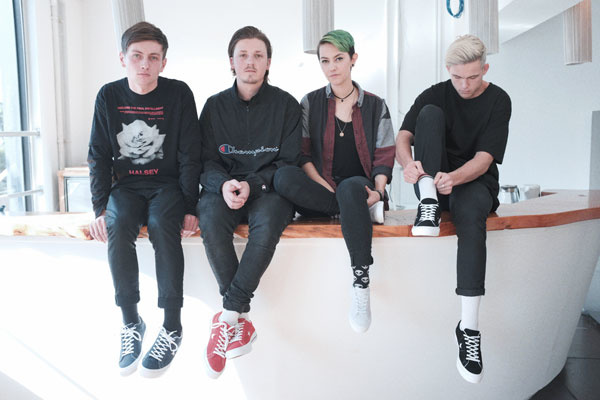
CDM: Do you find it important to use your musical and social platforms to share things that you’re passionate about?
GEORGE: For sure.
HARRY: Of course.
PJ: Definitely. In some instances, bands like Twenty One Pilots that are so big, can ultimately influence a large group of people. So you definitely want to share things that you’re passionate about - because they like your music, so you want to reflect that in lyrics.
CDM: I really love the message behind ‘Letting It Out’ - why do you think that self-doubt and acceptance are some of the hardest things for young people to deal with?
POSSUM: I think in some ways, it’s easier now than it has been ever before. There are more people promoting diversity of thought, and diversity of way of being in the world. But it’s always hard - part of it is this high school thing, the things that end up making you the most interesting and rewarding you in later life, are the things that people try and knock you down for when you’re a young person. It’s kill or be killed - you find people to pick on so you don’t get picked on yourself. We’re still living in a world where we’re being sent a lot of messaging about how to look, how we should be in order to be acceptable - even though fortunately now there is a lot more caverns of the internet and society that you can go into if you reject those more mainstream ideas. It’s always hard, and it’s always been at the core of the kind of music we all like and listen to, emo music, pop-punk music. But it’s interesting how that has extended into Twenty One Pilots, Melanie Martinez, Halsey - it’s not pop-punk anymore, and it’s not emo anymore, but the underlying emotions that drive it are the same. That’s what we want to be doing - it doesn’t matter about the timbres of the music, as much as the content.
GEORGE: What you’re saying, that message is developing into a more widely listened to genre--
CDM: The fact that Twenty One Pilots gets radio-play now.
GEORGE: Exactly. It wouldn’t just be like pop-punk back in the day - except for like Fall Out Boy or Blink-182 - where it was niche, only a certain group of people listened to it. It’s cool now, seeing people like Halsey and Melanie Martinez, who have genuine content to inspire people on such a large platform, because then you can access so many more people. Like Possum said, it’s becoming easier to be more free-range in what you think.
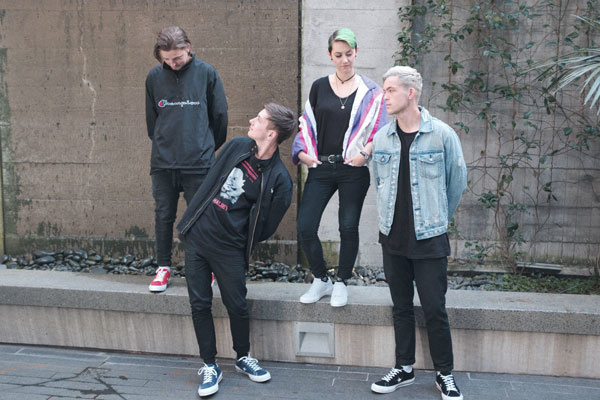
CDM: You played Big Gay Out, and are super open about supporting the LGBTQ+ community on social media. Do you think it’s important for pop music to be representative of more than just heteronormativity and traditional notions of sexuality and gender?
GEORGE: Absolutely. 100%.
POSSUM: The whole thing of the arts is that it’s for the weirdos. Music and art have always been influenced by queer folk, even when they weren’t out, even when they weren’t being given credit for it. Being on the fringe of society gives you a more nuanced and sophisticated perspective on things anyway - when you’re at the centre of everything you can’t really see. It’s awesome, a big portion of our fanbase are queer youth.
HARRY: Big Gay Out was the most insane gig.
GEORGE: So sick.
POSSUM: For me, I realised, I was scared to talk about stuff at first because you don’t know if that’s going to compromise some of your opportunities or if people are going to be uncomfortable with it. I was like, even with these guys, I don’t want to compromise any of their opportunities because I’m trying to be outspoken about some political shit. But then when you see how grateful people are for being honest and open about who you are, they’re like, ‘That helped me so much.’ Of course it’s worth it for that.
CDM: So many people growing up, even 10 years ago, wouldn’t have had that.
POSSUM: I didn’t really have that. But I know the people that when people did talk about stuff, it did make a big difference. So it’s paying that forward.

The new Converse One Stars are available now online (click here to purchase) and at Converse St Luke’s, Converse Manukau, Converse Sylvia Park and selected retailers across the country.
Watch Openside’s ‘Letting It Out’ music video below…

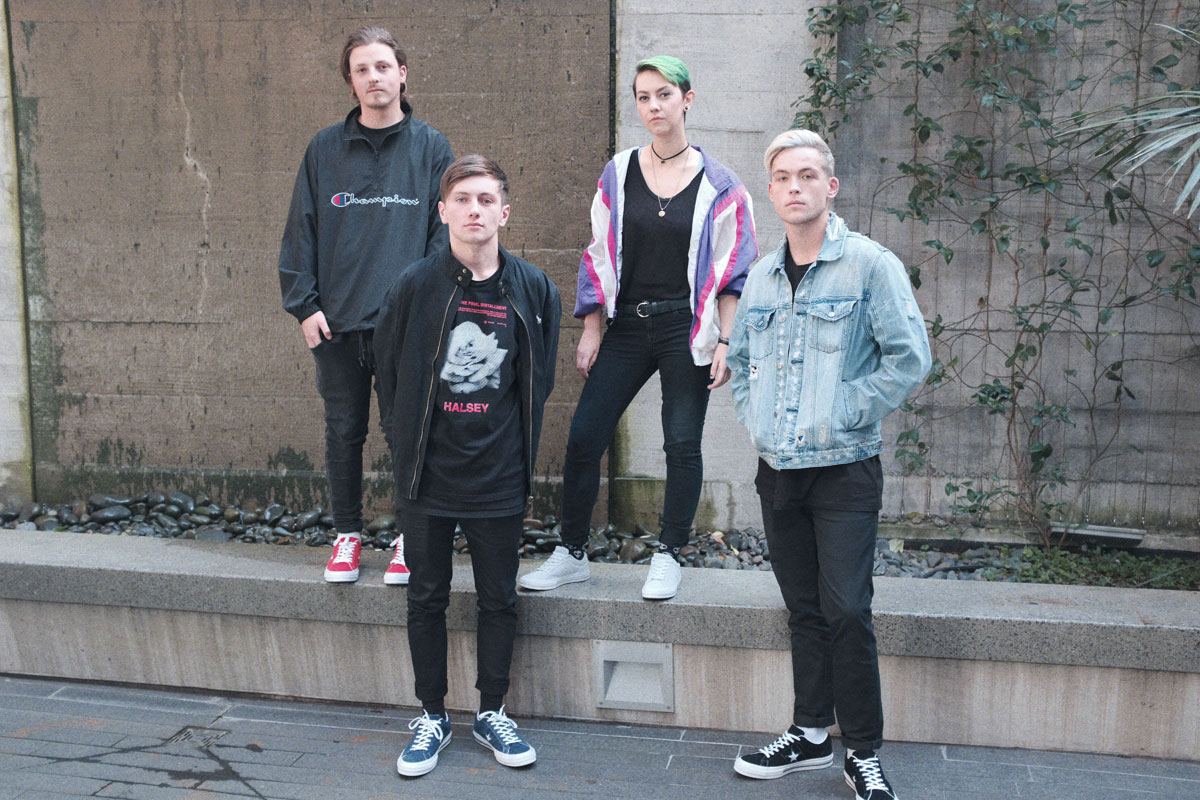
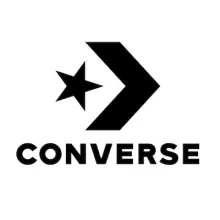 Converse
Converse